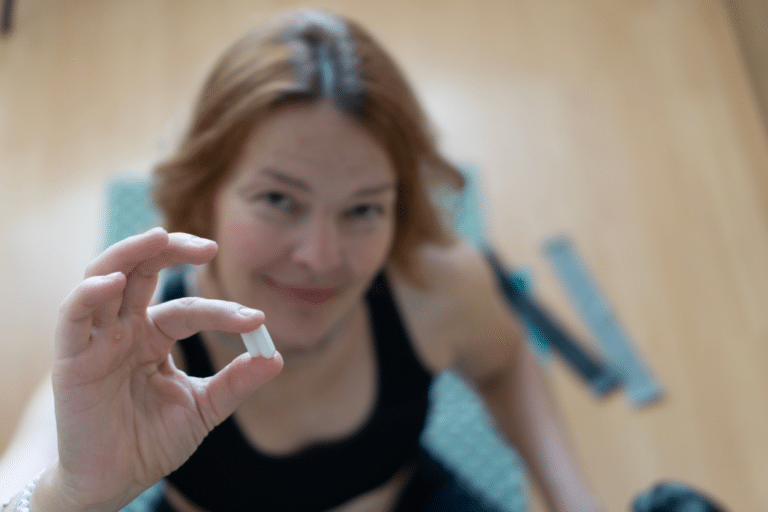Ladies, vaginal dryness is not dinner table conversation…so let’s go there!
Vaginal lubrication is an important part of the sexual response cycle. It can vary from woman to woman and from day to day. Normally, thanks to estrogen, the walls of the vagina stay plump and lubricated with a thin layer of clear fluid and all is well and comfy in your sex life.
BUT, a drop in estrogen levels decreases the amount of moisture available and the vaginal tissue begins to thin. This vaginal dryness can put a huge damper on your love life. It can lead to itching, burning, and painful intercourse. Fortunately, there are several treatments available to help you deal with the changes that occur.
Causes of Vaginal Dryness
As a woman approaches menopause (and beyond) the drop in estrogen levels causes something called vaginal atrophy. This is when the vagina becomes thinner and less elastic. Thinner walls mean fewer cells that produce moisture, which results in dryness.
Vaginal dryness can be the result of several other causes such as:
- Childbirth and breastfeeding
- Radiation or chemotherapy treatment for cancer
- Medications (such as cold and allergy medications, some antidepressants)
- Sjögren’s syndrome-an autoimmune disorder that causes dry mucous membranes
- Surgical removal of the ovaries
- Not enough foreplay before sex
- Douching or vaginal deodorants
Vaginal dryness is very common but can be an uncomfortable topic for many women, thus leaving them feeling alone and wondering what is going on. Not only can it be physically uncomfortable, but there are also emotional components as well. Many women experience a decrease in sexual confidence and their overall quality of life suffers as a result. Because it is so common, there is a variety of both over-the-counter (OTC) and prescription treatments.
Over the Counter (OTC) Products for Vaginal Dryness
Treatment of vaginal dryness with OTC products can be a bit overwhelming, as there are a lot of options.
- Lubricants are similar to natural lubrication and are used to make sex more comfortable. Lubricants are immediate-acting and are not absorbed into your skin. They are applied right before (or even during) sex. Lubricants are divided into three types; water, silicone, or oil-based:
- Water-based– a safe option to use during intercourse because they do not cause latex condoms to deteriorate. They are easy to use and easy to wash off. Read ingredient labels carefully though because some contain ingredients that can be harmful to you, such as parabens or propylene glycol. Check out https://www.ewg.org/skindeep/ to find safe options for you.
- Oil-based– products like baby oil, mineral oil, petroleum jelly, and vegetable oils cannot be used with condoms. They also leave a coating on your vagina that can be hard to wash off, which can increase your risk of bacterial
 Silicone-based– the category between water-based and oil-based. They last longer than water-based options and can be used with latex condoms. Some people find the texture to be less than desirable, and they also don’t wash off as easily.
Silicone-based– the category between water-based and oil-based. They last longer than water-based options and can be used with latex condoms. Some people find the texture to be less than desirable, and they also don’t wash off as easily.
- Vaginal moisturizers offer a more long-lasting approach to vaginal dryness. They are applied more regularly and can last up to 3-4 days. Be sure to read the ingredient list carefully as some contain harmful additives.
- DHEA (dehydroepiandrosterone) is available OTC as a topical cream. DHEA is a hormone that your body naturally produces in the adrenal gland. DHEA vaginal cream acts on the nerves in the vagina making them more sensitize to stimulation during sexual intercourse and also works to plump up thinning vaginal tissue. My favorite DHEA product is Julva.
Prescription Treatment for Vaginal Dryness
The most common treatment for vaginal dryness due to low estrogen levels is topical estrogen therapy.
There are three types of vaginal estrogen:
- Vaginal rings– placed in the vagina by the patient. They release a low dose of estrogen over 90 days.
- Vaginal creams– a disposable applicator is used to insert the cream into the vagina. Usually, the cream is applied daily for 1-2 weeks, then 1-3 times per week or as directed by your healthcare provider.
- Vaginal tablets– a disposable applicator is used to insert a tablet into the vagina once daily for the first two weeks of treatment. Then it is used twice a week.
Topical estrogen has been shown to be safe for women who have had breast or endometrial cancer. Products are available by prescription and over-the-counter.
The medication ospemifene (Osphena) is a prescription that makes vaginal tissue thicker and less fragile. Osphena is not a hormone, it works by acting like estrogen in the body. It is an oral tablet that is taken once daily with food.
Another medication, Intrarosa, is FDA approved for pain during intercourse due to vaginal atrophy. Intrarosa is a manmade form of DHEA. It is broken down in the body into active sex hormones, like estrogen. It comes as a tablet that is inserted into the vagina once daily at bedtime.
What You Need To Know About Vaginal Dryness
In summary, vaginal dryness is a very common, normal condition that most women experience during their hormonal life cycle. It can be very debilitating, both emotionally and physically for many women. The good thing is, there is a solution with some research, trial, and patience.
Dr. Anna Garrett is a menopause expert and Doctor of Pharmacy. She helps women who are struggling with symptoms of perimenopause and menopause find natural hormone balancing solutions so they can rock their mojo through midlife and beyond. Dr. Anna is the author of Perimenopause: The Savvy Sister’s Guide to Hormone Harmony. Order your copy at www.perimenopausebook.com.
Dr. Anna is available for 1-1 consultation. Find out more at www.drannagarrett.com/lets-talk




